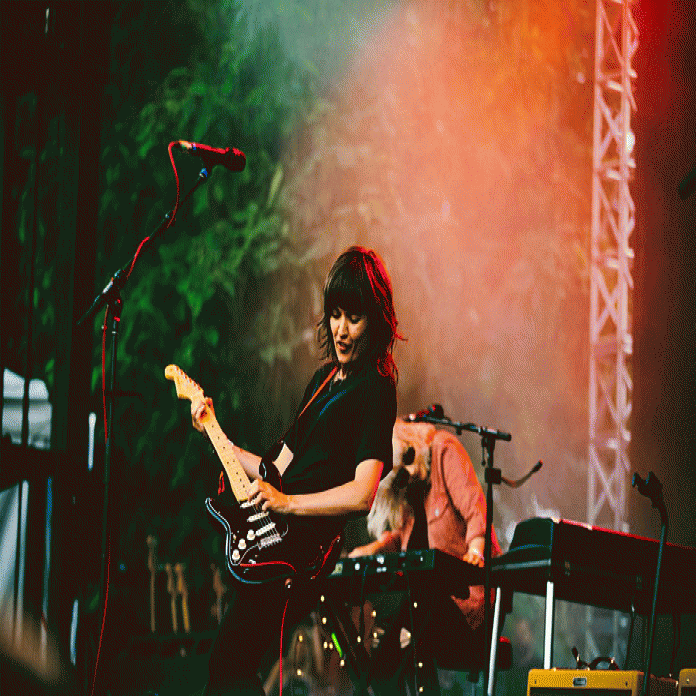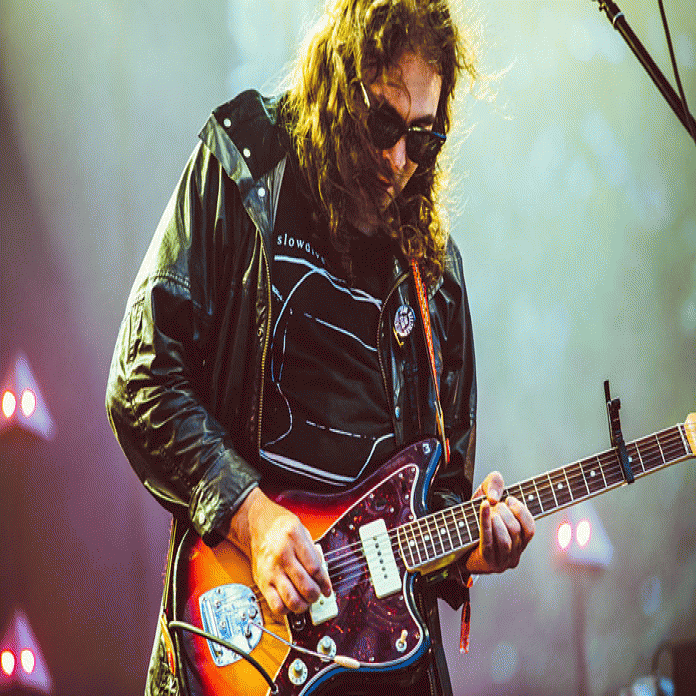
Pitchfork Music Festival
Pitchfork Music Festival 2018,
Jul 25, 2018
Pitchfork Music Festival
![]()
“Festival season,” for lack of a better term, can be mildly frustrating. The days feel endless, the festivals themselves can often turn into muddy, drunken shitshows, and the artists playing are typically exhausted, punching in for an hour set while in the midst of frenetic summer touring schedules. It is an infinitely tragic reoccurrence, a perpetual scam of exhaustion, overindulgence, and overpriced street food. And that’s just the overall atmosphere of most festivals—most major festivals—in a time where once-weekend getaways for obsessive fans turned into trendy, days-long parties—and the lineups are starting to reflect that, too. Ever since Lollapalooza, Bonnaroo, and Coachella—the holy trinity of major American music festivals—bailed on decent creative direction, their lineups have grown into stale and unflattering lists of what’s popular, rather than what is special and unique—though Coachella never seemed to be too interested in quality, rather than quantity. As a music obsessive in the modern age of transient pop culture, spring lineup announcements often bring about a communal who the fuck are these people?
So upon arrival at Pitchfork Music Festival, the annual bite-sized indie festival in Chicago’s Union Park, the immediate feeling is relief, followed by a smile. There, set neatly organized with plenty of open space, lies three stages, spread out in a perfect triangle, complemented by a dizzying row of local food trucks and a massive tented area filled with local shops and major indie labels alike. It is completely feasible that someone could spend their entire day just walking around and browsing, flipping through bottomless bins of LPs and 7-inches. Yet, it only gets better as the first artist of the day takes the stage, signifying the beginning to a day of comfortable listening and showmanship. The lineup’s form is usually quite predictable, as a majority of the artists are those who have received the Pitchfork accolade of “Best New Music” within the the past year or two, followed by a handful of oddball reunions—this year being Rafael Sadiiq, formerly of Tony! Toni! Tone!, late ‘70s avant-garde group This Heat, performing under the moniker of This is Not This Heat, and funk/soul veteran Chaka Khan—followed by a few local acts, this year being Melkbelly, Paul Cherry, Nnamdi Ogbonnaya, and The Curls. However, the most important and worthy of the artists are the big reunion shows, last year’s being LCD Soundsystem and A Tribe Called Quest. This Year, it was Ms. Lauryn Hill.
That’s what separates Pitchfork Music Festival from the rest—the tedious curation. The main focus of Pitchfork has and always will be the artists, and no matter who ends up on the bill, ticket sales are high, leaving them total creative freedom when each summer arrives. This is why you can walk from one stage to the next, witnessing a (massive) juxtaposition of musical styles and approaches, and everybody is still smiling, enjoying the day regardless of who is placed in front of them—the attendees are by and large fans and loyal supporters of independent music and art. This trait only emboldens Pitchfork’s reputation, because they are simply doing what nobody else will, and it pays off in the long run. The sponsors remain, the fans flock, and the quality is up kept, controlled, and always promising.
Friday:
Local Chicago mainstay Melkbelly got the ball rolling on Friday, presenting one of the best performances of the day, a mixture of pure, uninhibited guitar rock. That’s the beauty of a festival such as Pitchfork: delivering a platform for otherwise niche and obscure local bands, giving them the chance to play on the same stage as their idols. The same could be said for Julie Byrne, whose elated compositions were sparse and tranquil, bringing about a massive wave of Laurel Canyon nostalgia, backed by a violinist, harpist, and synthesizer. Chicago native Open Mike Eagle followed Byrne on the Blue stage—perhaps the festival’s finest and well-curated—in a casual and personable manner, conversing with the crowd of his native city and humbling us all in the process. Clouds were among us from the start, and rain showers were scattered all afternoon. That didn’t stop Julien Baker, though, who delivered a tear-jerking performance that brought the first ray of sunshine of the day. Chicago native Saba had the crowd in the palm of his hand on the Red stage, almost drowning out Baker in the process. Baker’s gorgeous voice persevered, and the both ended with screaming audiences, begging for more.
It came as no surprise, though, that Big Thief delivered the finest performance of the day, without a doubt. Arriving in a goofy, half-drunken fashion, Adrianne Lenker and co. played loose renditions of some of their most beloved songs, her voice transcending into other dimensions, as both guitarist Buck Meek’s offbeat solo’s played off of Lenker’s. There was something truly raw and mysterious in the air that day. Australian powerhouse Courtney Barnett delivered a set that consisted of mostly new material on the Red stage, and an additional guitarist did her sound wonders. However, due to the drunken party goers awaiting fellow Australian psych-lords Tame Impala, the crowd was quite dismissive towards Barnett. That didn’t matter. She still played her heart out. This brings us to the most troubling and disappointing set of the weekend: Tame Impala. Pitchfork was Tame Impala’s first time in Chicago in nearly three years. The visuals were on point, per usual, but the sound was low, dull, and fractured. At one point, frontman/mastermind Kevin Parker attempted to blame it on the equipment, as fans chanted “Louder! Louder! Louder!” in between songs. They won the drug-addled crowd over with hits such as “Elephant” and “The Less I Know the Better,” but it only made them sound that much more disparaging.

Saturday:
Saturday began on a mellow note, as local yacht-rocker Paul Cherry delivered an absurdly funky set in his hometown. Followed by Circuit Des Yeux, Haley Fohr’s deep bellows and droning backing band filled the crowd of wide-eyed fans and newcomers alike, presenting something that was truly unique and euphoric. Fohr performed on the Blue stage, of course. Are you starting to see a trend here? Moses Sumney had the crowd’s jaws on the ground, resurrecting the Green stage for a surreal performance, while Girlpool redefined their sound as a four-piece band on the Blue stage. Late ‘70s avant-garde cult-heroes This Heat, performing as This Is Not This Heat, performed a brooding set of drone rock, composed and delivered eloquently, the crowd walking away with a natural, euphoric high. There were two key performances on Saturday, though, that proved why Pitchfork is top-notch: Blood Orange and The War on Drugs. Blood Orange’s Dev Hyne’s sounded like a futuristic Prince, hopping back and forth between keyboard—an instrument he has beautifully mastered—and the guitar. And yes, his solos sounded exactly like Prince’s. His presence was equally mysterious and grounded, and he had the crowd in the palm of his hand. It was a high that nobody else was capable of delivering to a crowd that was, well, really fucking high. Followed by The War on Drugs, Adam Granduciel’s band was deafening, in perhaps the best way possible. Trimming his set list down and pumping his jams up, The War on Drugs brought to Union Park what no guitar-centric band did all weekend, blasting endless solos of psych-tinged Americana. It would have been appropriate if they replaced Tame Impala as Friday’s headliner, and Blood Orange replacing Fleet Foxes as Saturday’s. Fleet Foxes’ sound was hushed compared to The War on Drugs, leaving a quiet crowd in front of the Green stage. Though their sound expanded and enlightened as their momentum grew after each song, there was simply no way to live up to both Blood Orange and The War on Drugs.

Sunday:
The sun was finally consistent on Sunday, and the early crowds were sluggish, hung over, and very, very stoned. This changed immediately when Kelly Lee Owens took a hold of the Blue stage, pumping out a blissful—if not eardrum-bursting-mix of ambient-techno, carefully crafting her sound amongst a pile of synthesizers and drum machines. Sunday was the day of the Blue stage, and Owens was followed by Japanese Breakfast, whose sound was some of the best the festival had to offer. Front person Michelle Zauner was humbled and ecstatic, and the crowd was eating up every minute of it, playing her most beloved songs as well as a beautiful rendition of The Cranberries’ “Dreams.” Australian sleaze ball Alex Cameron followed, joined by his “business partner” and saxophonist Roy Molly. Cameron’s performance was a necessary cool down from the emotional moments of Japanese Breakfast’s set, and the crowd responded accordingly. However, the tears came pouring once again as (Sandy) Alex G took the stage, ironically coming onstage to Rascal Flatt’s “Life is a Highway.” This was one of the most overlooked sets of the weekend, and Gianascolli played both deep cuts and the majority of his latest album, Rocket, and was joined by Michelle Zauner for a duet of “Brite Boy.” It was a memorable moment, something that is typical of Pitchfork. Funk royalty Chaka Khan grabbed a hold of the crowd, making for Pitchfork’s most nostalgic moment. Khan’s backing band was by far one of the grooviest and most precise, and it was a perfect performance as the sun began to cool. Perhaps the most disappointing set was Japandroids. Balding middle-agers rushed the stage to see their rock n’ roll saviors reignite their late-aughts magic, but instead Japandroids delivered a stale set of material new and old. Their age showed, and the fiery and energy that Japandroids made their name for was absolutely nowhere to be found. Closing off the weekend was Ms. Lauryn Hill, who, per usual, ran a little tardy to her set. It didn’t matter, as Hill delivered her beloved 1998 album The Miseducation of Lauryn Hill in a scattered order, adding on a cover of Frankie Valli’s “Can’t Take My Eyes Off You.” Hill proved to be the best headliner by a long shot, another nostalgic moment to round out a festival of pure magic and delight.
As years pass, Pitchfork Music Festival proves to be the most impressive and solid of all American music festivals, and this year proved just that. It is a rare weekend of every year where tens of thousands of people can gather to witness an absurd variety of artists, and discover some new favorites in the process. Overall, it was an incredible experience and promising for the future of music festivals. Pitchfork took the chance, once again, to curate a festival that included whoever the hell they wanted, and it paid off in the best way possible, because people are hungry for more. Though an exhausting weekend indeed, it was a propitious glimpse into the future, a weekend brought together by a group of lovely and inclusive people, there for all the right reasons.

www.pitchforkmusicfestival.com
Support Under the Radar on Patreon.
Current Issue

Issue #72
Apr 19, 2024 Issue #72 - The ‘90s Issue with The Cardigans and Thurston Moore
Most Recent
- 10 Best Songs of the Week: Nilüfer Yanya, Linn Koch-Emmery, Fat Dog, Crumb, St. Vincent, and More (News) —
- Fat Dog Announce New Album and Tour, Share Video for New Song “Running” (News) —
- The Obsessed, Howling Giant @ Brooklyn Meadows, NYC, April 12, 2024 (Review) —
- Premiere: Slow Joy Releases New Single and Video for “King Cowboy” (News) —
- Premiere: Mackenzie Shrieve Shares New Single “Didn’t I Tell Ya” Feat. Jane Bruce (News) —

Comments
Submit your comment
July 27th 2018
3:18am
What an amazing music festival! Pitchfork is always my favorite!!